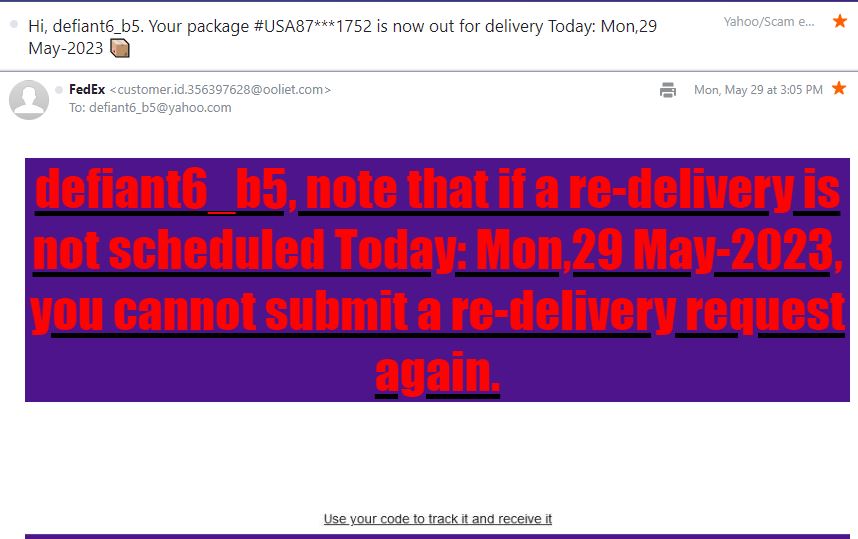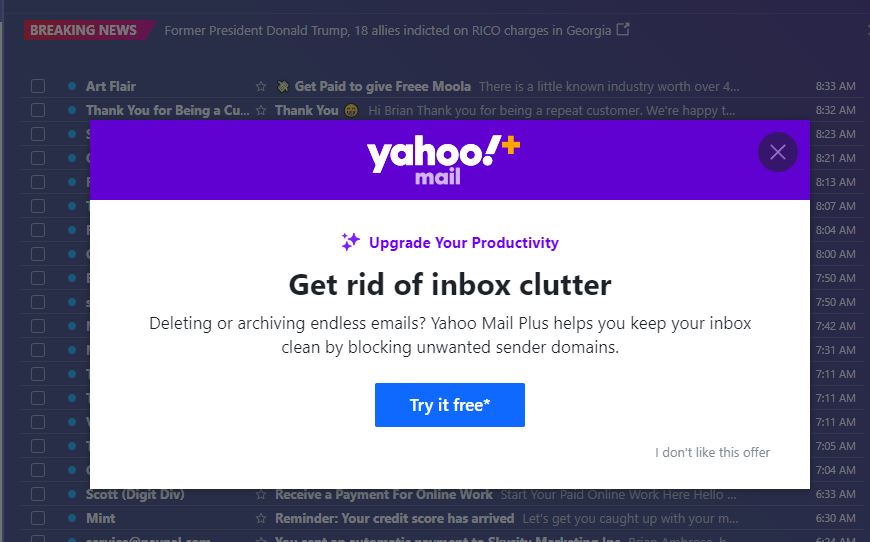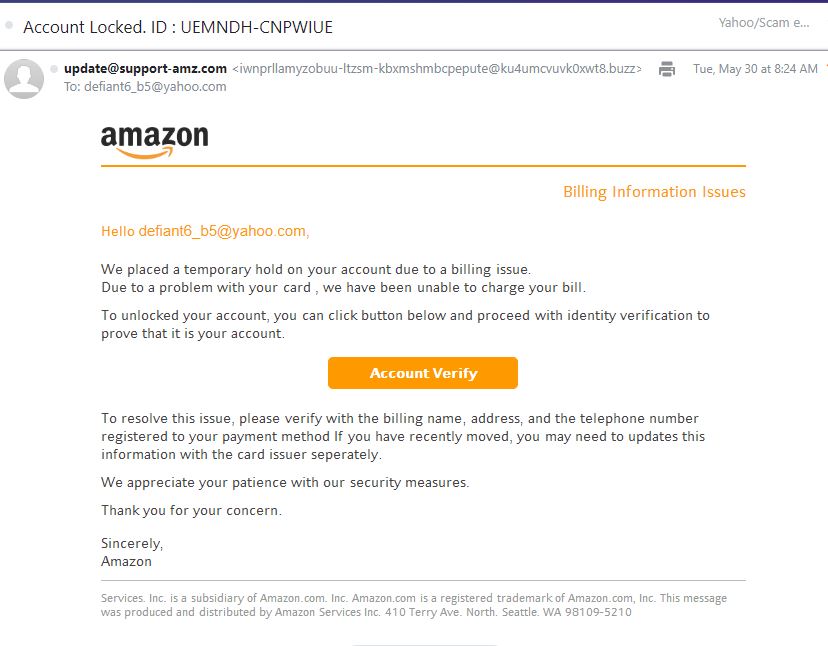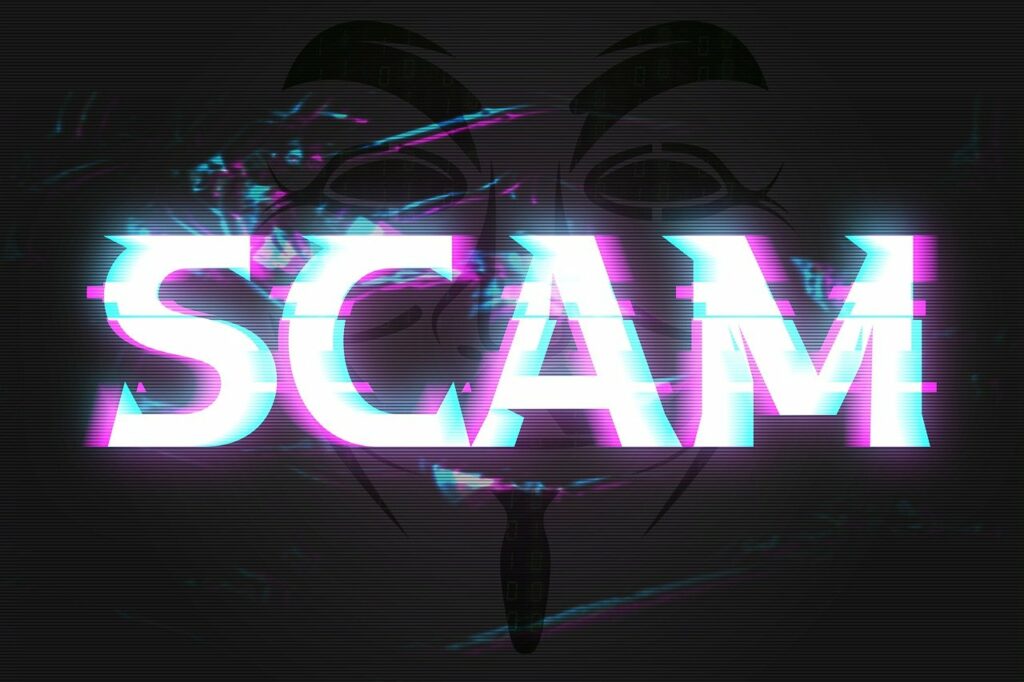The Latest Email Scams
Email scams are continuing to circulate out there. I know it has been some time since I’ve last talked about them, but phishing scams are continuing to enter millions of peoples inboxes daily and scammers hope that as many people as possible will fall for them. I for one don’t like to see anyone become a victim of these scams as I don’t want anyone to become a victim of identity theft or lose their hard-earned money.
I recently spoke to a seniors group at a church about scams and how to avoid them especially when it comes to email scams and so I went over some of the latest email scams out there as well as how to spot them and even how they can be reported so that the can hopefully be removed. I did also talk about scams over the phone, dating scams, IRS scams, phishing websites, and more.
One of the statistics I did mention to that group is that in 2022 alone, people were scammed a total of $8.8 billion and it continues to go up each year it seems. My goal is to prevent as many people as possible from being scammed and so I want to touch up a little on some of the latest scams circulating today.
Fake Invoice Scams
I haven’t really talked about this in detail, but this type of scam is getting more and more prevalent these days. It can be scary to get one of these scams in your email’s inbox because it a lot of times claims to be from your local utility company and will say that you still owe some money. What makes this scam so dangerous is that if you click the link in the email, it will take you to a website that looks like the real utility website, but is really a copycat designed to capture your financial information.
It can also come from a shipping company such as UPS, FEDEX, or DHL and even sometimes the US Postal Service. A lot of times an email that claims to be from one of these companies will say that you need to pay some money in order to receive the package that you’ve ordered (supposedly ordered). This one can be dangerous especially if you really are expecting a package that is being shipped by one of those companies.

Now just like the one claiming to be from your utility company, the shipping scam seeks to get you to pay a small fee in order to capture your financial information and then the scammers will begin to do real damage. It’s extremely important that you don’t click the link in these type of emails so that you don’t become a victim. There are ways to figure out that these type of emails are scams. A lot of times they will have spelling and grammatical errors and will also not use your name at all. A lot of times they’ll start as “Dear customer” or “Dear whatever@yahoo.com”.
If you really have account with the company the scams are mimicking or placed an order with the actual shipping company, they would usually address you by your first name.
Email Account Upgrade Scams
This one I’ll admit has kind of surprised me, but scammers will use anything they can to scam people which includes something legitimate to do it. I noticed in my own personal email account that I will from time to time, see an ad from the email company I use to upgrade my account to something that is ad free and has better security features that will help detect and prevent phishing scams from going through.
Apparently though scammers have figured out a way to mimic these email upgrade scams to their benefit. What they will do in this case is send an email claiming to be from the email provider saying that your upgrade has been approved and that you need to click the link in the email so that you can begin the upgrade. The issue is that the link will take you to a website that will look like the email provider’s website, but it is fake.

It’ll more than likely ask you to log in to your email using your log in credentials and then need you to put in your financial information such as a debit card or bank account information to pay for the upgrade. If you end up putting that information in though, you’ll end up giving the scammers exactly what they want which is a way to steal your money or even get into your email account.
If you do get an email like this, check the email address it came from. This will always be the number one thing to check on that will give away an email being a scam. If the email address, for example, doesn’t contain an @yahoo.com, @gmail.com, or @hotmail.com.com, the email came from a fraudulent place and you should either delete the email immediately or forward it to the actual company so they know about the scam and hopefully get it shut down.
Advance-fee Scams
This is actually a scam I’ve talked about before in the past because I have gotten these type of scams from time to time in my inbox. An advance fee scam can be something like an email claiming that you’ve won some kind of prize such as a lottery or someone claims that you’re owed a significant amount of money for something you’ve supposedly did. I’ll give an example from an email I received a couple of weeks ago.
I received an email from someone named Mr Fred White contacting me from the Finance Department out of Washington D.C. (Yeah this sounds legitimate already). I’m apparently supposed to be receiving an ATM Visa card containing $5.5 million. He does not say the reason that I am owed this money, but he does say exactly how I will receive this $5.5 million Visa card.
It will be sent through a courier service of my choosing from the available options which are FedEx and costs $300 for overnight delivery, DHL which will take two days and cost $250, UPS Courier service for $200 and 3 days to deliver, and finally Skylink Express for a 5-day delivery at $150. Boy, this sounds like a small price to pay for $5 million, right? Now how do I pay for either of those courier services? Mr Fred White explains how to do that.

I apparently will need to wire money for one of those courier services via MoneyGram or Western Union. Now if those don’t work for me, that’s ok because all I need to do is buy an iTunes gift card. Nothing fishy about that right? Buying gift cards to receive over five million dollars? Sounds legitimate to me! NOT!!
To some of you, you probably realize that this is easily a scam and in no way shape or form am I even going to get $5 million especially when asking for a gift card if I can’t wire money in order to receive this extremely large sum of money. If you truly won a monetary prize why would you have to pay a fee to receive it? There is MORE than enough money to pay for the winnings and have tons of money left over if there are any kind of fees that need to be paid. Let’s look at the recent $1.55 billion dollar lottery that was recently won by someone in Florida. Now that person won’t get the entire $1.55 billion prize because after state and federal taxes are paid out from that prize, he will get the remainder which is still quite a bit of money, well into the hundreds of millions of dollars.
The reason I’m mentioning that lottery prize winner is because he WON’T have to pay anything out-of-pocket in order to receive that lottery money. All taxes and fees will automatically be taken out of that massive prize and he’ll get the remainder. So if you receive something in your email’s inbox claiming that you’ve won something and that you have to pay something in order to receive it, run for the hills! It is definitely a scam!
Google Docs scams
This is a phishing scam that I don’t really have experience with, but still a dangerous one that you certainly want to avoid. Apparently, there will be an email that will say you’ve been invited to participate on a Google document and there will be a link provided in the email that will supposedly take you to the document.
The problem though is if you click that link, it’ll take you to someplace that will look like an authentic Google document, but won’t be and is designed to steal your information or install malware or viruses on your computer. NEVER click a link to a Google document that you are not aware of or have ever worked on before as you don’t know the true origin or purpose of it.
As I said above, I haven’t received these type of scams before in my inbox, but that doesn’t mean I won’t ever receive them and I have gotten emails before that contained downloads or pdfs that the person sending it to me wanted to open. Needless to say since I wasn’t expecting anything like that, I didn’t dare download or open those. I instead deleted the emails as I didn’t want to take the chance that I would infect my computer.
Protect Yourself
These are just some of the latest scams circulating out there these days. There are other scams out there too such as what’s called the Dropbox scam and HR scam. I’ve received a Dropbox scam before, but never something claiming to be from HR especially from a job.
The best way to protect yourself from becoming a victim of any of these type of scams are to look for red flags, some of which I mentioned earlier. The best way to spot a fraudulent email is to always check the email address it came from. Next, see how the email is addressed to you. If it says something such as Dear Customer, or dear whateryouremailaddressis@whatever.com, you know that it is fraudulent because they never addressed you by your name. Now some phishing scams are getting better at that by including your first name, but it can still be a phishing email so you’ll want to look for the other red flags such as spelling and grammatical errors and the email address.

Never let emotion take control of you because that’s what a lot of these scammers are counting on. They either want you to feel a sense of panic such as something being wrong with your account that you may have with the actual company (though usually there truly is nothing wrong with your account), or they want you to feel such a sense of joy, amazement or happiness at the thought of receiving large sums of money that you won’t think twice about sending them money in order to get your cash prize.
I encourage you to share this information with as many people as you can, because the more people know about how to spot phishing scams and avoid becoming a victim of them, the better. Scammers are able to steal billions of dollars each and every year from people and once that money is gone, it’s extremely rare that someone will get it back because a lot of scammers tend to be overseas. Never give out your bank account information either over the phone or via a link in an email that could be fraudulent. If you’re unsure of something, trust your gut and question it as much as possible. If you do these things, it’ll be less likely that you become a victim of a phishing scam especially from the latest email scams circulating today.

